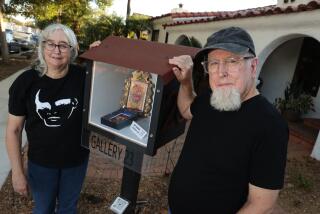Art Gallery, Director Acquitted in Mapplethorpe Photo Exhibit : Obscenity: Jury rejects the prosecution’s contention that sexually graphic works lack artistic value.
CINCINNATI — An art gallery and its director were acquitted Friday of obscenity charges by a jury that rejected prosecution claims that sexually graphic photos by Robert Mapplethorpe lacked artistic value.
The obscenity trial was the nation’s first of an art gallery.
“What a great day!” gallery director Dennis Barrie told reporters.
The jury of four men and four women returned the verdicts after slightly more than two hours.
Barrie smiled slightly as a clerk read the verdict. When the clerk finished, Barrie smiled broadly, said, “All right!” and hugged his attorney, H. Louis Sirkin.
Spectators in the Hamilton County Municipal Court room shouted and applauded.
Judge David Albanese expelled gallery board Chairman Roger Ach and Robert Allen, whose video production company sponsored the exhibit, when they jumped out of their seats to hug Barrie.
The jury cleared the Contemporary Art Center and Barrie of misdemeanor charges of pandering obscenity and using children in nudity-related material. Barrie could have been sentenced to one year in jail and fined $2,000, and the gallery fined $10,000, if convicted on both counts.
“Obviously, this is a very emotional moment. It’s been a very hard time for me,” Barrie said. “We did something very important for this city. We stood up for the 1st Amendment.
“This is a major battle fought here today. It’s a major battle for the arts and for freedom of expression in America.”
However, the Rev. Donald E. Wildmon, whose American Family Assn. in Tupelo, Miss., has fought National Endowment for the Arts funding for exhibits such as the Mapplethorpe, said, “This is not a landmark, Pearl Harbor decision. This was just another obscenity trial.
“I think this really puts the NEA issue right back in the political arena where it belongs.”
In closing arguments, defense attorneys contended that there was no basis for the charges of using children in nudity-related material because the mothers of the children gave their consent. The prosecution contended that consent was not in writing when the exhibit opened.
The defense also noted the U.S. Supreme Court’s three-pronged test of obscenity: Material must appeal to a prurient interest in sex, be patently offensive according to contemporary community standards, and must lack redeeming artistic, scientific or political value.
“The jury has made its decision. We accept it,” said Frank Prouty, assistant city prosecutor.
During closing arguments, Prouty told jury members it was up to them to decide the artistic merit of the photographs.
“Are these Van Goghs, these five pictures?,” he asked.
Prouty told the jury to judge what they considered to be art using contemporary community standards, not the standards of art experts who testified for the defense.
Prouty recited the fable of the vain emperor who, although naked, believed he was fully clothed because his subjects praised his imaginary clothing.
“The art world wants to tell you these are art. And the townspeople sat there and watched the emperor walk down the street without any clothes on, but yet all his advisers told him ‘You have a beautiful coat,’ because nobody wanted to come out and tell them that it’s not art.
“You are the townspeople. Don’t let somebody from outside come in and say it is art. You say whether these five pictures are like the emperor without any clothes on.”
Sirkin, Barrie’s attorney, said the five photos no doubt offended some people, but have serious artistic merit.
He quoted from a speech by John F. Kennedy:
“Society must set the artist free to follow his vision, wherever it takes him. We must never forget that art is not a form of propaganda. It is a form of truth. The highest duty of the writer, the composer, the artist, is to remain true to himself.”
“That’s exactly what Dennis Barrie did,” Sirkin said. “He wanted to share with this community a beauty that he felt was shown by an artist, Mr. Mapplethorpe.”
Sirkin reminded jurors that the same exhibit was shown in Philadelphia, Chicago and Berkeley without incident.
“Is Cincinnati that different? Are we that childish? Are we not big enough to say we can’t accept what other cities have seen?” Sirkin asked.
Defense experts have testified that Mapplethorpe was an accomplished and respected photographer, and that photographs of the children were morally and sexually innocent. Mapplethorpe died last year of AIDS at age 42.
The exhibit drew 81,000 people during its seven-week run last spring, an attendance record for an art exhibit in Cincinnati. It closed Friday in Boston, where 103,000 tickets were sold.
Attorney Marc Mezibov, representing the gallery, said the state failed to prove its case. No presentation was made to back up the assertion that the photographs were not legitimate art.
“Have you thought why it is that no one for the state of Ohio came in and testified that the exhibit had no serious artistic value? Don’t you think that if there were people out there who thought that, the state of Ohio would have found them?” Mezibov asked.
More to Read
The biggest entertainment stories
Get our big stories about Hollywood, film, television, music, arts, culture and more right in your inbox as soon as they publish.
You may occasionally receive promotional content from the Los Angeles Times.










